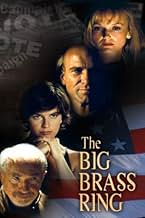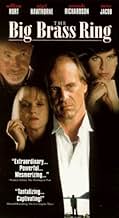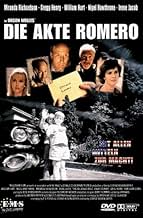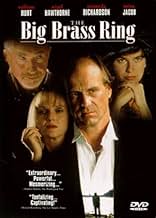Blake Pellarin is on the campaign trail to become Governor of the state of Missouri. During his stop in St. Louis, a chance encounter brings his past roaring back to haunt him. Will the trut... Read allBlake Pellarin is on the campaign trail to become Governor of the state of Missouri. During his stop in St. Louis, a chance encounter brings his past roaring back to haunt him. Will the truth ruin his chances to be elected, or will he land the "Big Brass Ring"?Blake Pellarin is on the campaign trail to become Governor of the state of Missouri. During his stop in St. Louis, a chance encounter brings his past roaring back to haunt him. Will the truth ruin his chances to be elected, or will he land the "Big Brass Ring"?
- Awards
- 1 win & 3 nominations total
Irène Jacob
- Cela
- (as Irene Jacob)
Peggy Freisen
- Gigi Moorehead
- (as Peggy Friesen)
Featured reviews
5=G=
"The Big Brass Ring" tells of a Missouri gubernatorial candidate (Hurt) who find himself haunted by guilt, stalked by a beautiful reporter, and the possible target of an assassination plot. A blotch on "Singblade" director Hickenlooper's resume coming on the heels of a worthy little indie "Dogtown", this tale of redemption and regret loses it humanness in a circus of pompous dialogue, overwrought histrionics, vague noir ambiance, and disjointed editing. In spite of fine performances and filming, "The Big Brass Ring" can't manage one believable character much less one reason to care leaving only a sense of detached ambivalence and confusion. A very attractive but passable DVD watch for fans of the players only. (C)
I found this a moving and refreshingly upbeat "take" on the "flawed hero" theme. The pursuit of power has led all the characters to make ruthless and morally dubious choices yet they still strive for some sort of decency in their relationships and by the end of the film have just about achieved this. Yes it's a bit melodramatic but unrealistic? - the more I learn of American politics the more real it seems ( Clinton? Kennedy?) Don't be put of by those reviewers who claim the plot isn't clear. If you pay attention it is! Pellarin's body guard for example is a Vietnam veteran & turns against Blake when he discovers he draft-dodged. The performances are all excellent, particularly William Hurt's as Blake. For the first time I realised I may actually have something in common with these larger than life politicians and they may be as interested as I am in making the world a little better for us all.
This is a murky story of politics, scandal, sex and deception. Sounds like it should have been a great film, but it wasn't. The basic plot was sound as we might expect from Orson Welles. But the way it was presented was too disjointed and abstruse. Without reading the original script, it is hard to tell if the responsibility for this lies with Welles, Oja Kodar (who did the adaptation) or George Hickenlooper, the director. I suspect it is the latter two.
The biggest problem I had was character development. By the end of the film one should reasonably expect the pieces to fit together. Good character development should give us insight into the characters' motivation. I found this lacking. The flashbacks didn't really help us to understand the motivations of the characters as much as they should have. It seems that the brothers voluntarily switched identities, since Billy was wearing a name tag that said "Romero" on his uniform when he left to go to war. So, Blake really didn't steal his brother's identity as it appeared. This wasn't made very clear.
There were lots of loose ends here. What motivated the limo driver to do what he did? Was it a need to be close to power, or some personal vendetta? Who knows?
From a directorial and cinematography point of view, the film was far too dark, that is, underexposed. I'm certain they were trying for that look, but it made the photography look as if it were shot on 30 year old film of poor quality. Also, the audio was very bad. It was very difficult understanding a lot of the dialogue.
William Hurt was miscast in this role. For certain films, his puling, self tortured style of delivery are appropriate to the character (Big Chill, Broadcast News, Children of a Lesser God). However, in this film his character required a more dynamic and confident portrayal, which he was unable to deliver.
Nigel Hawthorne gave the best performance as Kim Mennaker, the Senator who brought the boys up. His ability to portray the old political warhorse, seduced by the trappings of power was excellent.
Irene Jacob gave a good performance as Cela, the reporter with an obsession for the candidate and the truth behind him.
Overall, the whole was less than the sum of the parts. The presentation was ponderous and uneven and the direction mediocre at best. Worth a 5/10. If you are looking for political campaign stories, there are better choices (Primary Colors, The Candidate, with Robert Redford).
The biggest problem I had was character development. By the end of the film one should reasonably expect the pieces to fit together. Good character development should give us insight into the characters' motivation. I found this lacking. The flashbacks didn't really help us to understand the motivations of the characters as much as they should have. It seems that the brothers voluntarily switched identities, since Billy was wearing a name tag that said "Romero" on his uniform when he left to go to war. So, Blake really didn't steal his brother's identity as it appeared. This wasn't made very clear.
There were lots of loose ends here. What motivated the limo driver to do what he did? Was it a need to be close to power, or some personal vendetta? Who knows?
From a directorial and cinematography point of view, the film was far too dark, that is, underexposed. I'm certain they were trying for that look, but it made the photography look as if it were shot on 30 year old film of poor quality. Also, the audio was very bad. It was very difficult understanding a lot of the dialogue.
William Hurt was miscast in this role. For certain films, his puling, self tortured style of delivery are appropriate to the character (Big Chill, Broadcast News, Children of a Lesser God). However, in this film his character required a more dynamic and confident portrayal, which he was unable to deliver.
Nigel Hawthorne gave the best performance as Kim Mennaker, the Senator who brought the boys up. His ability to portray the old political warhorse, seduced by the trappings of power was excellent.
Irene Jacob gave a good performance as Cela, the reporter with an obsession for the candidate and the truth behind him.
Overall, the whole was less than the sum of the parts. The presentation was ponderous and uneven and the direction mediocre at best. Worth a 5/10. If you are looking for political campaign stories, there are better choices (Primary Colors, The Candidate, with Robert Redford).
I never knew running for governor was so leisurely. Plenty of time for extra curricular activities...
The movie was interesting but confusing. I like a little mystery in my movies, but it was tough to keep all the balding white guys with multiple names straight -- especially in the flashbacks.
However, CNN correspondent Christiane Amanpour (Irène Jacob) never looked so good.
The movie was interesting but confusing. I like a little mystery in my movies, but it was tough to keep all the balding white guys with multiple names straight -- especially in the flashbacks.
However, CNN correspondent Christiane Amanpour (Irène Jacob) never looked so good.
This may be a flawed masterpiece or perhaps a mediocre movie with a lot to recommend it. I enjoyed it and would like to see it again, partly to make sure the plot worked and partly to catch some nuances that I missed. And also because, as my esteemed colleague, flickjunkie, notes below, the audio is atrocious and my ears are not as sharp as they once were. But life is short and the entire opus of film is long...but maybe I can edit with the fast forward!
Okay, let's look at the evidence. Script by Orson Welles: somewhat amazing since he died in 1985. His last work. That alone may make this worth watching. William Hurt plays a southern pol, Blake Pellarin, running for governor of Missouri. Miranda Richardson plays his rich, alcoholic wife, and she is very good. Nigel Hawthorne is Kim Mennaker, Blake's one time mentor, a shadowy, behind the scenes political figure, a cynical character who is writing a 27,000-page memoir, which no doubt includes much about his love for the Pellarin boys. Irène Jacob plays Cela Brandini, a TV reporter fascinated with Blake. The one-time protégé of French-Polish director Krzysztof Kieslowski is not shown to advantage here. I'm not sure why, but there is little subtlety in the way she plays the part. To really appreciate what she can do, see her in La Double vie de Véronique (1991) or Trois Couleurs: Rouge (1994), both directed by Kieslowski. She is very beautiful and very winning.
William Hurt, contrary to some opinion, was excellent. His characteristic laid-back, almost languid style works strangely well for a southern pol. He is certainly different, but believable, although I don't think his style would have worked had his character been running for president, as in Welles's original script. (Incidentally, they really wanted Louisiana, not Missouri, for the locale.) Hurt's performance reminds me in some ways of his work in the outstanding but now somewhat neglected, Kiss of the Spider Woman (1985), for which he won an academy award.
The Big Brass Ring never had a theatrical release, and it is not hard to see why. The print is too dark and the story too murky and hard to follow. It appears that the brothers changed identities when young and never bothered to change back. Apparently Blake's brother and not Blake was the subject of the homosexual photo, but I'm not sure. To make this movie work for a mass audience, the true status of the boys then, and during the time of the action, must be made clear.
(Note: Over 500 of my movie reviews are now available in my book "Cut to the Chaise Lounge or I Can't Believe I Swallowed the Remote!" Get it at Amazon!)
Okay, let's look at the evidence. Script by Orson Welles: somewhat amazing since he died in 1985. His last work. That alone may make this worth watching. William Hurt plays a southern pol, Blake Pellarin, running for governor of Missouri. Miranda Richardson plays his rich, alcoholic wife, and she is very good. Nigel Hawthorne is Kim Mennaker, Blake's one time mentor, a shadowy, behind the scenes political figure, a cynical character who is writing a 27,000-page memoir, which no doubt includes much about his love for the Pellarin boys. Irène Jacob plays Cela Brandini, a TV reporter fascinated with Blake. The one-time protégé of French-Polish director Krzysztof Kieslowski is not shown to advantage here. I'm not sure why, but there is little subtlety in the way she plays the part. To really appreciate what she can do, see her in La Double vie de Véronique (1991) or Trois Couleurs: Rouge (1994), both directed by Kieslowski. She is very beautiful and very winning.
William Hurt, contrary to some opinion, was excellent. His characteristic laid-back, almost languid style works strangely well for a southern pol. He is certainly different, but believable, although I don't think his style would have worked had his character been running for president, as in Welles's original script. (Incidentally, they really wanted Louisiana, not Missouri, for the locale.) Hurt's performance reminds me in some ways of his work in the outstanding but now somewhat neglected, Kiss of the Spider Woman (1985), for which he won an academy award.
The Big Brass Ring never had a theatrical release, and it is not hard to see why. The print is too dark and the story too murky and hard to follow. It appears that the brothers changed identities when young and never bothered to change back. Apparently Blake's brother and not Blake was the subject of the homosexual photo, but I'm not sure. To make this movie work for a mass audience, the true status of the boys then, and during the time of the action, must be made clear.
(Note: Over 500 of my movie reviews are now available in my book "Cut to the Chaise Lounge or I Can't Believe I Swallowed the Remote!" Get it at Amazon!)
Did you know
- TriviaThe "big brass ring" of the title is a reference to the high brass rings found in old fashioned gyms and swimming pools, which one was supposed to jump up to and grab. It is a metaphor for that which is difficult to attain, or at least hard to hold fast and retain.
- GoofsIn the scene just after Blake (Hurt) and Brandini (Jacob) make love, she is still in bed and trying to encourage Blake to go public with the truth. She suggests that she might expose him if he doesn't. Blake yanks off the bedcovers, exposing her completely-naked body. But in the next-second close-up, something covers her from the waist down.
- ConnectionsReferences Citizen Kane (1941)
- SoundtracksMortal Thoughts
Written and Performed by Scott Nickoley (ASCAP) and Jamie Dunlap (as Jaime Dunlap) (BMI)
Published by Red Engine Music (ASCAP), Revision West (BMI), Brunello Music (ASCAP), JDSoul Music (BMI)
Courtesy of Mark Ferrari/Mastersource
Details
- Release date
- Country of origin
- Languages
- Also known as
- The Big Brass Ring
- Filming locations
- Production companies
- See more company credits at IMDbPro
Box office
- Budget
- $7,000,000 (estimated)
- Runtime
- 1h 44m(104 min)
- Color
- Sound mix
- Aspect ratio
- 1.33 : 1
Contribute to this page
Suggest an edit or add missing content

































